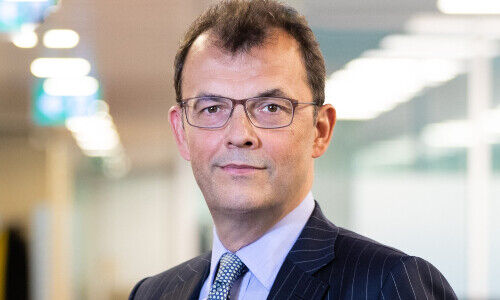Jean Keller, the CEO of Geneva-based fund boutique Quaero Capital, believes in the future of investing in a sustainable economy. Companies are encouraged to set net-zero greenhouse gas emission targets, he explains in an interview with finews.com.
Quaero Capital positions itself as a highly specialized fund provider focused on sustainable investments, offering funds launched and actively managed based on proprietary research, and primarily marketed to institutional and semi-institutional investors.
«We offer funds with listed and unlisted companies, investments in infrastructure, and also real estate assets in France,» Quaero CEO Jean Keller told finews.com. Although the year has not been a good one for listed assets «our investment strategy and active management helped prevent worse,» he added.
In response to the high demand for impact and sustainable investments Quaero launched a net zero emissions fund, which invests in companies whose services, products or technologies are expected to be part of the transition to a zero-carbon economy. It will invest across industries in current and future leaders in energy and environmental transition and the circular economy, he said.
«We prefer a concentrated approach with a portfolio of 30-25 stocks and a strong team of experts. In clean energy, renewables are competitive and strategic, and we focus on offshore solar and storage technologies. In 'hard-to-reduce' industries such as high-temperature industrial processes like steel, chemicals, and cement, (and) we look at areas such as carbon-neutral cement, agriculture, and food production. Non-animal proteins are an interesting segment» as well, said the CEO.
Success Forged in Difficult Years
With inflation pressure, high volatility, and many uncertainties, this year «was a real roller coaster ride. But years like this will determine long-term success,» Keller is convinced. «If you invest where everyone else is investing, you're not going to be better than average. You have to look outside the mainstream for value and opportunity.»
Keller believes a return to the pre-pandemic globalized economy and the Ukraine war is unlikely, with geopolitical uncertainties remaining high.
Look to Fundamentals
«When selecting investments in this environment, the only thing that helps is to look at fundamentals and long-term trends on a longer investment horizon. In doing so, one must also not be too hesitant and let oneself be distracted by daily news,» he says.
Currently, Quaero distributes 13 Luxembourg funds and one Swiss fund focused on listed small- and mid-caps through its Geneva headquarters and further offices in Zurich, Paris, and London. It also has active partners in Germany and Italy.
«Our business is split almost one-third each between Switzerland and France. The UK, Germany, and Italy together account for around 40 percent.» At the end of November, the firm had assets under management of 2.73 billion euros ($2.88 billion), compared to just under 3 billion euros at the end of 2021.
«We want to continue to grow and expand. In German-speaking Switzerland, we recently appointed a new sales manager, Claudia Eftimie, in Zurich.» Currently, Quaero employs a total of about 70 people, and «we can imagine an increase of around 10 percent, both on the fund management side and in sales.»
Deal Flow Decisive
In the fund business, the deal flow pipeline of new projects that fit into the portfolio is one of the most important factors, he said. «Here we have a high level of in-house expertise long on experience in the infrastructure sector and medium and smaller projects,» and demand from private and institutional investors remains high in this area, he said.
Sustainable investing is a broad field with different approaches and strategies. «Impact investing is still a comparatively clear and distinct thing. You give the money to companies that contribute to transformation.»
Exclusion is where things get more difficult. «Exclusion won't necessarily have the desired effect. In the end, the worst climate offenders could mutate into private or state-owned companies over which shareholders and investors no longer have any influence. I don't think Russia's President Vladimir Putin puts much stock in the sustainability of his oil and gas industry, but there are certain behaviors that on a moral basis don't want to profit from, and companies that exhibit such behavior will be excluded.»
«Engagement is much more important to us. It's how we can have a real impact. We as investment managers can influence companies, and we see this especially in our investments in micro- to small-cap companies. We encourage companies to set net-zero greenhouse gas emissions targets, and we know they're listening.»
Regulation is Welcome
Keller welcomes EU regulation and believes it to be effective. Several funds having recently been downgraded from Article 9 to Article 8 under the disclosure rules are evidence that fund providers are taking the issue seriously. «Regulation is serving the industry well and is perhaps the best thing the EU has done so far.»
But the world cannot be saved by the financial industry alone, «it also needs companies, politicians, consumers and, in the end, every individual,» to be part of the solution, Keller says.
He even shows some sympathy for the «Last Generation» climate activists, even if the actions are sometimes questionable. «You can't change the world without also crossing the boundaries of the existing system once in a while.»




































